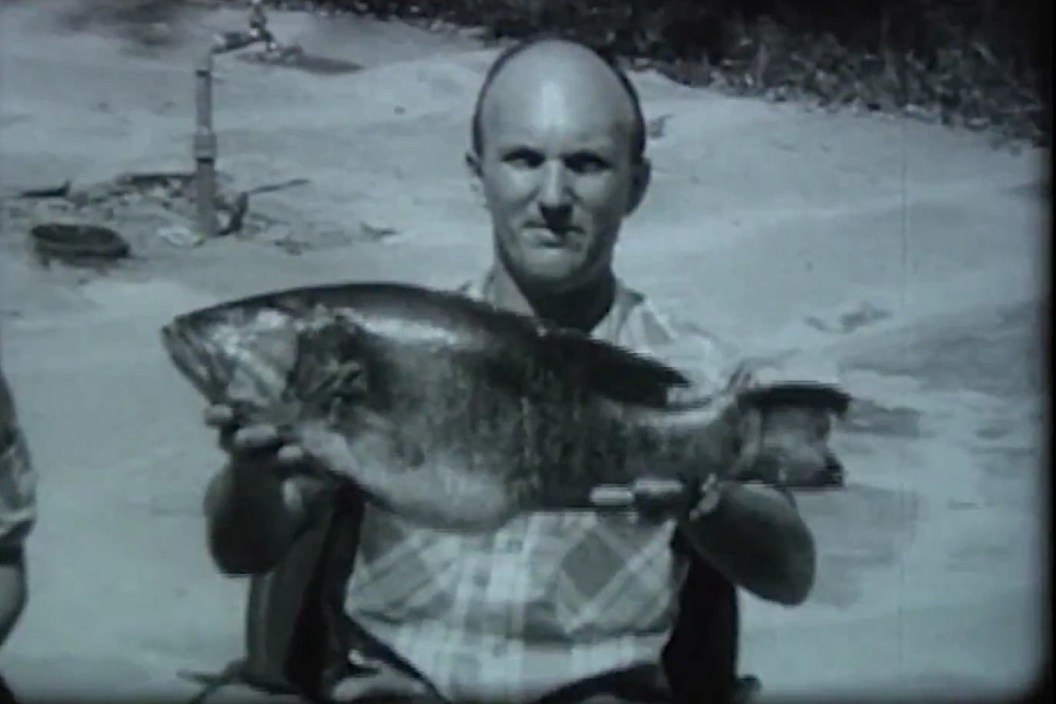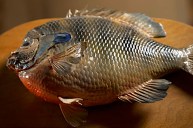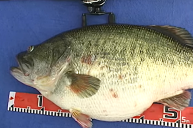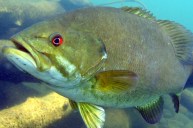When talk turns to the all-tackle world records for freshwater fish, George Perry's 1932 record largemouth bass is almost always the first fish on everyone's mind.
Of course, the Perry bass has since been equaled with a tying fish in Japan, and even topped unofficially with fish that were never entered into the record books. However, there's one bass record recognized by the International Game Fish Association that has stood atop the record book for decades. A record so large that there are zero known contenders that come even remotely close to challenging it.
We're talking of course about the largest smallmouth bass ever caught. David Hayes caught the world record, an 11-pound, 15-ounce monster in Dale Hollow Lake, a reservoir that straddles the border between Kentucky and Tennessee back in 1955. Many anglers have tried but no one seems to be able to get anywhere remotely close to this legendary record fish, not even while fishing the best smallmouth lakes on the planet.
That's not the only wild part of the story of this freshwater fishing tale, either. This fish was later temporarily stricken from the IGFA record books due to an extremely controversial claim. It was then quietly reinstated as the rightful record holder after a thorough investigation. The Hayes smallmouth is truly one of the wildest stories in bass fishing history. This is the full tale of a legendary record that may be impossible to break.
How the World Record Smallmouth Was Caught
Dale Hollow Reservoir covers a portion of the Kentucky and Tennessee border spanning approximately 27,000 acres. It's a man-made body of water constructed by the U.S. Army Corps of Engineers. In 1955, then 30-year-old Kentucky resident David Lee Hayes was president and manager of DG Hayes Wholesale Grocery. This guy knew Dale Hollow extremely well, and frequently fished its waters during this time period.
Hayes had used an early version of a depth finder to pinpoint one area that stood out. It was an area where he had hooked up with an extremely large fish twice before, only for it to throw the hook each time. Hayes was convinced it was the same record-breaking bass. For the fateful July 9, 1955 trip, he decided to bring along his wife and son. They started trolling a brand-new white bomber lure on 20-pound test line through the area where Hayes knew the big fish was hiding.
It's rather incredible that this record smallmouth was caught while trolling, a rarely-used method for this species. Another fascinating aspect of this story is just how far back Hayes had his lure. He estimated it was between 250 to 300 feet from the boat. Smallmouths, of course, are notorious fighters, which meant Hayes was in for a real battle when the fish first struck the lure.
"He came up one time, and then he went down deep. And he didn't come back on top of the water until he got tired," Hayes said in a 2019 interview with KY Afield.
Hayes had to wake his wife and son, who'd fallen asleep, to help him get the big smallie into the boat. After a long battle, they got the monstrous bass next to the boat and were finally able to net him. The fish was exhausted but found a second wind after hitting the deck of the boat and thrashing about wildly. It sounds just like one of today's smallmouth bass, battling until the very end.
The fish was so large, it wouldn't fit in his cooler. Hayes knew he had a big fish, but he had no idea the magnitude of what he'd just accomplished at that moment.
According to Bassmaster, Hayes went back to fishing until he realized he needed fuel. He went to Wisdom Resort to fill up, and the attendant who filled his tank asked Hayes if he had any luck. Hayes mentioned he'd caught a nice smallmouth and showed it to the man.
"I opened the cooler up and he said: 'My God, let me have that fish,' he took off and took it inside," Hayes told KY Afield.
Inside the resort, the fish weighed 11 pounds, 15 ounces on a scale that was not certified. When Hayes came inside, he thought the staff was joking with him when they told him he had a world record fish. When he realized they were serious, Hayes got back on his boat and headed over to Cedar Hill Resort. This resort had a set of certified scales which confirmed the 11-pound, 15-ounce weight. One key aspect of the story here is that Hayes let the staff at the resort do the handling and weighing once he arrived. Remember this part, because it comes into play 40 years later.
After being weighed on the certified scale in front of dozens of eyewitnesses, it was easy for Field & Stream (who officiated and kept freshwater fishing records until 1975) to certify the Hayes fish as a new smallmouth bass record.
Hayes had the big fish mounted and hung it in his house. That seems like it should be the end of the story, but it wasn't.
The Hayes Bass Gets Disqualified
Fast forward to 1996, 41 years after the Hayes bass is caught. Hayes was asked to put his famous fish on public display at an outdoors show, to which he agreed. It ended up being a fateful decision, because at the show a few people who saw it started questioning the validity of the fish. Some people questioned the weight while others questioned the colors, which didn't match the smallmouths normally caught at Dale Hollow.
There was an explanation for the off colors. According to taxidermist Butch Skillern, a longtime friend of Hayes, the angler sent the mount to Chicago for repainting sometime in the 1980s. That part of the story is relayed in the video above. The taxidermist who did the retouching work repainted the fish to more closely resemble a bass caught in Illinois rather than Kentucky or Tennessee.
However, some people still questioned the weight. According to Bassmaster, it was primarily freelance writer and assistant high school principal Eldon Davis, who began his own investigation into the fish. Shortly after, he uncovered a dusty affidavit from the office of the Corps of Engineers at Dale Hollow Lake that dated back to 1955. In this affidavit, Cedar Hill Resort dockhand Raymond Barlow, aka: "Doughbelly," presented a story to authorities where his nephews claimed the Hayes bass weighed 8 pounds, 15 ounces. The reason they knew this? The affidavit claimed that nephews Ira and John H. Barlow had tampered with the fish. Remember "Doughbelly," he comes into play in this story again later.
In any case, the Washington Post notes that Hayes had left the big bass at the resort in cold storage. While Hayes was away, the affidavit claims Cedar Hill Resort owner Dick Roberts urged John Barlow to tamper with the fish. John Barlow then claimed his brother Ira held the fish while John crammed a bunch of sinkers and some small parts from a boat motor down its throat. They claimed they also closed the throat with a treble hook. After the weigh-in, they claimed to have removed the extra weight with Hayes never knowing what really happened.
To further drive home the tampering story, Davis managed to track down John Barlow, who was nearly 80 years old by this point. Barlow was given a polygraph test on the incident, which he allegedly passed.
Based on that evidence, the IGFA took the Hayes smallmouth out of the books in 1996. The National Freshwater Fishing Hall of Fame also chose to remove the Hayes bass from their records. Hayes found out from a Bassmaster writer when he was reached for comment.
The Hayes Bass is Reinstated
It didn't take long for the claims of the Barlow affidavit to come under scrutiny of their own. To some, certain parts of the story just didn't add up. It was enough for the Tennessee Wildlife Resources Agency to launch their own investigation into the matter. During this process, the story quickly began to unravel, and all the fingers pointed back to John Barlow.
By 1996, many of the people named in the affidavit had since died. However, TWRA assistant director Ron Fox located a handful of witnesses. Cedar Hill dock worker Bobby Stone told the director he examined the fish closely and never saw any signs of tampering. Stone was also adamant no one could have tampered with the bass, mostly because Stone slept on top of the freezer guarding it until it was sent to the taxidermist!
Remember Barlow's brother Ira? The one who allegedly held the fish while John stuffed the weights in? According to Bassmaster, Ira was working at Cedar Hill the day Hayes caught the fish. He specifically recalled that his brother John was not even at the resort the day of the fateful catch. In fact, he claimed John wasn't even an employee of the resort. The owner, Dick Roberts, had fired him long before that. It's worth noting Ira passed a polygraph on these claims and later reiterated that the fish was real on his deathbed in 1998.
But wait, there's more! Raymond Barlow, aka: "Doughbelly," the guy who presented the affidavit to the Army Corps of Engineers in the first place, may have had his own shady motives too. Bassmaster notes Raymond had something of a grudge of his own against the Cedar Hill Resort. Raymond worked for Dale Hollow Marina as a guide, a role that made him essentially a direct competitor of Cedar Hill. "Doughbelly" was also said to be extremely jealous when it came to big fish catches. Seeing how John and Raymond Barlow both had a bone to pick with Cedar Hill, it's not much of a stretch to imagine they conspired to make up the story as some kind of revenge act against a former employer and competing dock. After all, the Hayes bass resulted in a great deal of publicity for Cedar Hill Resort. Raymond died in 1975, so there was no way to further investigate this part of the story. However, the motive to make Cedar Hill look bad makes a lot of sense in this context.
Fox even managed to locate the dockhand who weighed the bass on the uncertified scale at Wisdom Resort, where the fish first weighed 11 pounds, 15 ounces. The dockhand confirmed the initial reported weight, which really throws an extra cloud of suspicion on Barlow's claims. Then there's resort owner Dick Roberts. Bassmaster notes he had also passed away by the time of the TWRA investigation, but Fox learned Roberts had a sterling reputation in the community. Roberts' son was reportedly insulted with the insinuation his father would have asked anyone to fake a world record. As if all this evidence wasn't enough, Bassmaster also notes the attorney who prepped the affidavit owned another competing resort in the area, providing even further motive against Cedar Hill.
Then there's the undeniable measurements of the Hayes bass, which may be the best evidence of all. The fish was 27 inches long and had a 21 2/3-inch girth. Using tried and true methods of estimating a fish's weight with these measurements, the formula gives you a weight in the 12- to 13-pound range. Remember that Hayes kept the bass in a cooler for hours before it was officially weighed at the marina. There's no question the fish lost some weight between the catch and the final weigh in. By most educated estimates, the fish had to weigh at least 12 pounds when Hayes first landed it.
In the end, it seems David Hayes was unfairly caught in the middle of some personal issues between people at the resort. The evidence uncovered by the TWRA was simply overwhelming. The IGFA and Fishing Hall of Fame later chose to re-instate the Hayes smallmouth as the rightful world record.
Why the Hayes Smallmouth Record May Never Be Broken, and One Final Mystery
It cannot really be understated how much of a freak of nature the David Hayes smallmouth bass actually was. The next biggest smallmouth ever caught was also landed at Dale Hollow Reservoir in 1969 by John Gorman. That 10-pound, 14-ounce fish is still one pound and one ounce away from the Hayes bass. Dale Hollow produced another giant in the 1980s when Paul E. Beal hauled a 10-pound 8-ounce smallie from its waters.
However, those fish, and another 10-pound, 8-ounce smallmouth caught in a different lake, are the closest anyone has ever come to topping the Hayes bass. In most parts of the country, a seven- or eight-pound smallmouth is a rarity. A nine-pounder is a once-in-a-lifetime catch. Ten pounds is almost unheard of. In fact, Wheeler Dam Tailwater in Alabama and Hiawassee Reservoir in North Carolina are some of the few locations other than Dale Hollow to ever produce a double-digit smallmouth. Catches in states like Michigan and Idaho have come close in recent years, but haven't touched the record.
Furthermore, remember that Hayes caught the biggest smallmouth bass ever in July. Had he caught it in the spring prior to spawning, when fish are at their fattest, it's arguable this bass would have been closer to the 13-pound mark. This wasn't just the fish of a lifetime. It was the fish of a thousand lifetimes.
You probably have better odds of winning the Powerball than you do breaking the smallmouth bass world record.
David Hayes died at the ripe old age of 95 in July 2020, only two days before the 65th anniversary of his catch. When he passed, he ended up taking one last secret about his big bass with him: exactly which state he caught the fish in. As we mentioned earlier, Dale Hollow straddles the line between Tennessee and Kentucky. As a result, both list the Hayes bass as their state record. However, Hayes was extremely tight-lipped about the exact location of the catch for his whole life. In a February 2012 interview with NOOGA Today, he responded to a reporter's question about the catch location with: "I caught the fish within 500 feet of the state line."
Of course, he didn't reveal exactly which state. Perhaps it's better that way. After all, a wise angler never reveals his best fishing spot!
For more outdoor content from Travis Smola, be sure to follow him on Twitter and Instagram For original videos, check out his Geocaching and Outdoors with Travis YouTube channels.




